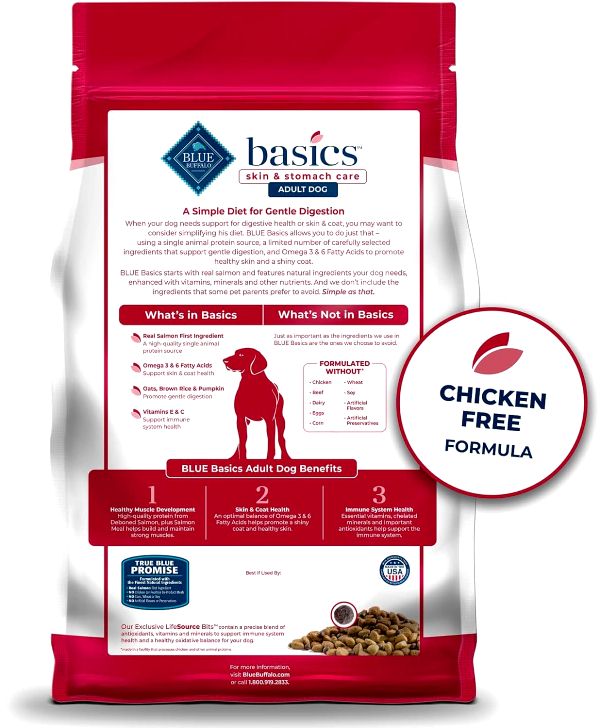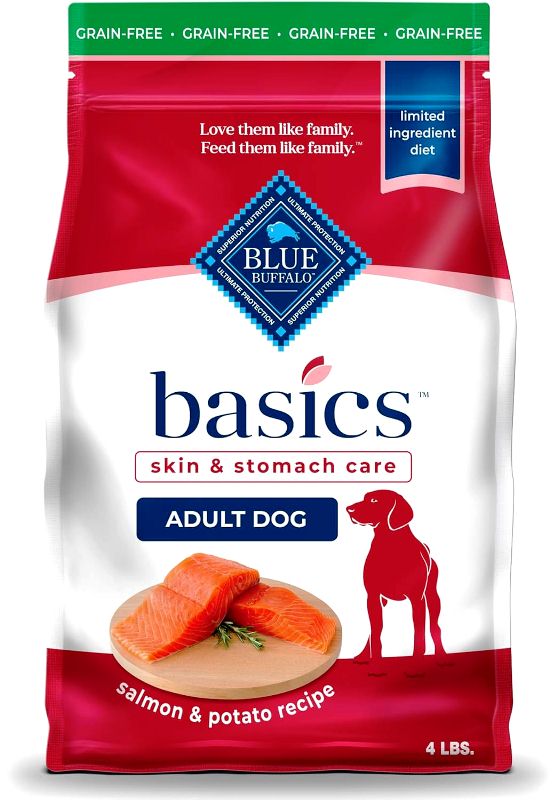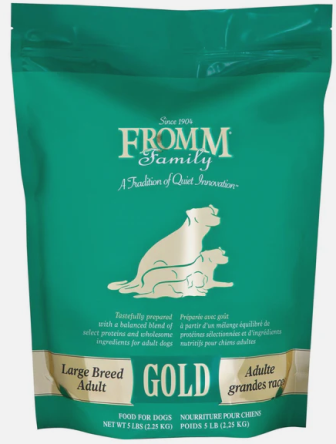Best Dogs Foods With Allergies
Best Dogs Foods With Allergies : Dealing with food allergies in dogs can be a challenging task for pet owners. Allergies can manifest through various symptoms such as itchy skin, chronic ear infections, gastrointestinal issues, poor coat condition, frequent paw licking, and red or inflamed skin. Identifying the specific allergens is crucial for the health and comfort of your dog.
Food allergies can often be pinpointed through an elimination diet, which involves removing potential allergens from the dog’s diet for a period and then reintroducing them one by one to identify the culprit. Working with a veterinarian during this process ensures the dog’s nutritional needs are met and helps accurately identify the allergens.
One of the most effective dietary approaches for managing food allergies in dogs is the Limited Ingredient Diet (LID). LIDs are designed to minimize the number of ingredients in the food, reducing the risk of exposure to allergens. These diets typically feature a single protein source and a single carbohydrate source, which helps in isolating and identifying specific allergens.
They also contain minimal additives, preservatives, and artificial ingredients, further reducing the risk of allergic responses. Some of the top brands offering LIDs include Natural Balance L.I.D. Limited Ingredient Diets, which provide various protein options such as duck, venison, and bison paired with simple carbohydrates like sweet potatoes, and Blue Buffalo Basics Limited Ingredient Diet, which features proteins like turkey and salmon along with easily digestible carbohydrates like potatoes and peas.
Another excellent option for dogs with allergies is hypoallergenic dog foods. These foods are specifically formulated to reduce or eliminate potential allergens and often use novel proteins and carbohydrates that are less likely to cause allergic reactions. Hydrolyzed protein diets, where proteins are broken down into smaller components, are less likely to trigger an immune response. Novel protein diets utilize uncommon protein sources such as kangaroo, rabbit, or alligator, which are less likely to be recognized by the dog’s immune system as allergens.
Royal Canin Veterinary Diet Hydrolyzed Protein and Hill’s Prescription Diet z/d are top brands that offer such diets. Royal Canin’s product is ideal for dogs with severe allergies, as it breaks down proteins into small peptides to avoid immune detection, while Hill’s Prescription Diet z/d uses hydrolyzed proteins and a single carbohydrate source to minimize allergic reactions.
Grain-free diets are another category worth considering for dogs with food allergies, particularly for those allergic to grains like wheat, corn, and soy. Grain-free diets replace these ingredients with alternative carbohydrates such as potatoes, lentils, or peas. Merrick Grain-Free Dog Food and Taste of the Wild Grain-Free are two prominent brands in this category. Merrick offers a variety of protein sources, including beef, chicken, and lamb combined with sweet potatoes and peas, while Taste of the Wild features novel proteins like bison and venison with vegetables and fruits for added nutrition.
For dogs with severe allergies or multiple sensitivities, home-cooked diets can be an excellent option. This approach allows complete control over the ingredients and can be tailored to avoid known allergens. However, it’s essential to ensure the diet is balanced and meets all nutritional requirements. Consulting with a veterinarian or a pet nutritionist is recommended to ensure the diet provides all necessary nutrients.
When preparing a home-cooked diet, choose lean meats like chicken, turkey, or fish as the protein source, use rice, sweet potatoes, or quinoa as the carbohydrate source, and incorporate dog-friendly vegetables like carrots, spinach, and green beans. Adding necessary supplements, such as calcium and omega-3 fatty acids, ensures the diet is balanced.
Raw diets, also known as BARF (Biologically Appropriate Raw Food) diets, consist of uncooked meat, bones, fruits, and vegetables. Proponents argue that raw diets can improve coat condition, energy levels, and reduce allergies. However, raw diets can pose risks of bacterial contamination and should be prepared with care. Stella & Chewy’s Freeze-Dried Raw and Primal Pet Foods Raw Frozen are top brands that offer raw food in convenient formats. Stella & Chewy’s offers various protein sources like chicken, duck, and rabbit in a freeze-dried format, while Primal Pet Foods provides a balanced raw diet with a mix of meats, fruits, and vegetables.

In addition to choosing the right food, certain ingredients should be avoided to prevent allergic reactions. Common allergens include beef, dairy, chicken, wheat, corn, and soy. Beef is one of the most common protein allergens in dogs, while dairy can cause gastrointestinal issues due to lactose intolerance or milk protein allergies. Some dogs are allergic to chicken, and gluten intolerance can lead to digestive problems. Corn and soy, often used as fillers in dog foods, can also cause allergies.
Supplementing the diet with specific additives can help manage allergies and improve overall health. Omega-3 fatty acids, found in fish oil, can reduce inflammation and improve skin and coat health. Probiotics, beneficial bacteria that support gut health, can improve digestion and immune response. Antioxidants like vitamins E and C can boost the immune system and help combat allergic reactions, while digestive enzymes aid in breaking down food and can reduce allergic reactions related to poor digestion.
When transitioning to a new diet, it’s important to do so gradually to avoid gastrointestinal upset. Start by mixing a small amount of the new food with your dog’s current food, and over the course of 7-10 days, gradually increase the proportion of the new food while decreasing the old food. Monitor your dog for any adverse reactions, including changes in stool, appetite, or energy levels, and adjust the diet as needed. If your dog shows signs of discomfort or allergy, consult your veterinarian and consider trying a different hypoallergenic food.
Working closely with your veterinarian is essential when managing your dog’s food allergies. A veterinarian can help diagnose the specific allergens, recommend suitable diets, and monitor your dog’s health throughout the process. Regular check-ups ensure that the chosen diet meets all nutritional needs and effectively manages allergy symptoms. In conclusion, finding the best food for dogs with allergies requires a careful and informed approach.
Limited Ingredient Diets, hypoallergenic foods, grain-free options, home-cooked meals, and raw diets all offer potential solutions for managing food allergies. By understanding common allergens, recognizing symptoms, and working closely with a veterinarian, pet owners can significantly improve their dogs’ quality of life. Tailoring a diet to your dog’s specific needs can lead to a happier, healthier pet free from the discomfort of food allergies.
Additionally, it’s essential to keep in mind that a holistic approach to managing your dog’s allergies can further enhance their health and well-being. This approach includes not only choosing the right food but also considering other factors such as environmental allergens, grooming routines, and overall lifestyle.
Environmental Allergens and Their Impact
Dogs can be allergic to various environmental factors such as pollen, dust mites, mold, and certain chemicals found in cleaning products or lawn treatments. These allergens can exacerbate food allergies, making it more challenging to manage your dog’s overall health. Regular cleaning of your home, especially areas where your dog spends most of their time, can reduce exposure to these allergens. Using hypoallergenic bedding and washing it frequently in hot water can help minimize dust mites. Additionally, limiting your dog’s exposure to freshly treated lawns or recently cleaned floors can prevent reactions to chemicals.
Grooming and Hygiene
Maintaining a proper grooming routine is crucial for dogs with allergies. Regular baths using hypoallergenic shampoos can help remove allergens from your dog’s skin and coat, reducing itching and irritation. Be sure to use lukewarm water and a gentle, sulfate-free shampoo to avoid drying out your dog’s skin. For dogs with long hair, regular brushing can help prevent matting and allow you to spot any skin issues early. Pay special attention to your dog’s ears and paws, as these areas are common sites for allergic reactions. Cleaning your dog’s ears with a veterinarian-approved solution can prevent infections, and wiping their paws with a damp cloth after outdoor activities can remove potential allergens.
Stress and Its Effects on Allergies
Stress can exacerbate allergies in dogs, much like it can in humans. Ensuring your dog has a calm, stable environment can help manage allergy symptoms. Provide plenty of physical exercise and mental stimulation to keep your dog happy and healthy. Activities such as walks, playtime, and training sessions can reduce stress levels. Additionally, creating a designated quiet space for your dog to retreat to when they feel overwhelmed can be beneficial. This space should be comfortable, free of allergens, and stocked with their favorite toys and bedding.
Holistic Supplements and Natural Remedies
Incorporating holistic supplements and natural remedies into your dog’s routine can support their overall health and help manage allergies. Omega-3 fatty acids, as mentioned earlier, are excellent for reducing inflammation and promoting skin health. Additionally, herbal supplements such as nettle leaf, quercetin, and licorice root have anti-inflammatory properties that can alleviate allergy symptoms. Always check with your veterinarian before introducing new supplements to make sure they are safe and appropriate for your dog’s specific needs.
Monitoring and Regular Check-Ups
Regular monitoring and veterinary check-ups are essential for managing your dog’s allergies effectively. Keep a detailed journal of your dog’s symptoms, noting any changes or patterns that may indicate an allergic reaction. This information can be invaluable for your veterinarian when assessing your dog’s condition and making dietary recommendations. Regular blood tests and allergy testing can help track your dog’s progress and adjust their treatment plan as needed.
Socialization and Training
Proper socialization and training are crucial for all dogs, but especially for those with allergies. Socializing your dog from a young age can help them adapt to various environments and reduce stress-related allergy flare-ups. Training your dog to respond to basic commands and establishing a routine can provide structure and stability, which can be particularly beneficial for dogs with allergies.
Building a Support Network
Building a support network of fellow pet owners, veterinarians, and pet nutritionists can provide valuable insights and support as you navigate managing your dog’s allergies. Online forums, local pet groups, and social media communities can offer advice and share experiences that might help you find new strategies for managing your dog’s condition.
Importance of Consistency
Consistency is key when managing food allergies in dogs. Once you have identified a suitable diet, stick to it and avoid giving your dog any foods that are not part of their prescribed meal plan. This includes treats, table scraps, and any human foods that might contain allergens. Consistent feeding routines help prevent accidental exposure to allergens and make it easier to monitor your dog’s reaction to their diet.
Patience and Persistence
Managing food allergies in dogs requires patience and persistence. It can take time to identify the right diet and see improvements in your dog’s condition. Stay vigilant, keep detailed records, and maintain open communication with your veterinarian. With dedication and care, you can significantly improve your dog’s quality of life and help them thrive despite their allergies.
Conclusion
Food allergies in dogs can be a challenging issue, but with the right approach, they are manageable. A combination of Limited Ingredient Diets, hypoallergenic foods, grain-free options, home-cooked meals, and raw diets offers a range of solutions tailored to your dog’s specific needs. Recognizing the symptoms of food allergies and working closely with a veterinarian ensures that your dog receives the best care possible. Additionally, addressing environmental allergens, maintaining proper grooming routines, managing stress, and incorporating holistic supplements can further support your dog’s health. Consistency, patience, and a holistic approach are key to successfully managing food allergies in dogs, leading to a happier and healthier life for your beloved pet.



